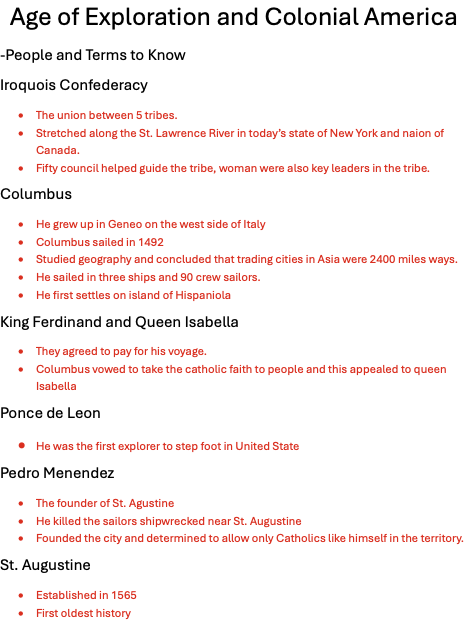Age of Exploration and Colonial America
Christopher Columbus - Discovered the Americas in 1492, leading to widespread European exploration and colonization.
Ferdinand Magellan - Led the first expedition to circumnavigate the globe, proving the vastness of the Earth.
Iroquois Confederacy
· The union between 5 tribes.
· Stretched along the St. Lawrence River in today’s state of New York and naion of Canada.
· Fifty council helped guide the tribe, woman were also key leaders in the tribe.
Columbus
· He grew up in Geneo on the west side of Italy
· Columbus sailed in 1492
· Studied geography and concluded that trading cities in Asia were 2400 miles ways.
· He sailed in three ships and 90 crew sailors.
· He first settles on island of Hispaniola
King Ferdinand and Queen Isabella
· They agreed to pay for his voyage.
· Columbus vowed to take the catholic faith to people and this appealed to queen Isabella
Ponce de Leon
· He was the first explorer to step foot in United State
Pedro Menendez
· The founder of St. Agustine
· He killed the sailors shipwrecked near St. Augustine
· Founded the city and determined to allow only Catholics like himself in the territory.
St. Augustine
· Established in 1565
· First oldest history
Santa Fe –
· Founded in 1610
· 2nd oldest history
Historiography
· Is how history is written
John Wycliffe
· English reformer for the protestant of reformation.
Protestant Reformation
· A religious movement that challenged the authority of the Catholic Church, leading to the creation of Protestant churches.
King Henry VIII
· He pulled England out of the catholic church, and he started his own church
Spanish Armada
· A fleet of Spanish ships sent to conquer England. England defeated them, which marked a major shift in naval power. (1588)
Jamestown and John Smith
· Jamestown was settled by the joint stock company hope make its investors rich in 1607.
Pocohantas
· Native American woman associated with the Jamestown colony; known for her connection with John Smith and later marriage to John Rolfe.
Separatists/Pilgrims and Plimoth Colony
· A group that wanted to separate completely from the Church of England. They settled Plymouth Colony in 1620.
Mayflower and Mayflower Compact
· Mayflower: The ship that brought the Pilgrims to America.
· Mayflower Compact: An agreement to govern their colony fairly and cooperatively.
Puritans and Massachusetts Bay Colony
· Wanted to purify the Church of England from within, not separate. Settled Massachusetts Bay Colony.
John Winthrop and “City on a Hill”
· Leader of the Puritans; promoted the idea that their colony would be a moral example for others.
Roger Williams
· Banished from Massachusetts for advocating religious freedom; founded Rhode Island.
Possible Quick Answer Questions
Before Columbus arrived, how many Native Americans lived in what is now the U.S.? 2 to 10 million leaved in U.S.
Where would you find the Iroquois Confederacy? New York
What foods were staples for Native Americans in the Southwest or Great Plains?
· Southwest: Corn, beans, squash (the "Three Sisters")
· Great Plains: Bison, maize
What food was a staple for Native Americans in the Pacific Northwest? Salmon
Columbus was born in what would today be the nation of Italy (Genoa).
The Jamestown settlement would be in the current state of Virginia.
The Pilgrims settled Plimouth Colony in the current state of Massachusetts.
1. How did the Protestant Reformation play a major role in both the Pilgrims and the Puritans forming colonies in the New World?
The Protestant Reformation led many in England to seek religious freedom and break away from the Church of England. The Pilgrims and Puritans came to the New World to worship freely and create communities based on their beliefs.
2. How did England become a Protestant nation?
King Henry VIII made England Protestant when he broke away from the Catholic Church in the 1530s. He formed the Church of England after the Pope refused to grant him a divorce.
3. How did England face the Spanish Armada?
In 1588, Catholic Spain sent the Spanish Armada to conquer Protestant England. England defeated the Armada with the help of strong naval tactics and bad weather, securing its Protestant future.
4. What were the beliefs of Separatists (Pilgrims)?
The Separatists believed the Church of England was too corrupt to fix and wanted to form their own independent churches. They left England to find a place where they could worship freely.
5. What were the beliefs of the Puritans?
Puritans wanted to reform or "purify" the Church of England from within. When they couldn’t do that in England, many moved to America to build a society based on their religious values.
6. Why did they focus on education more than other colonies?
The Pilgrims and Puritans believed everyone should read the Bible for themselves. Because of this, they built schools and colleges, making education a key part of their communities.
